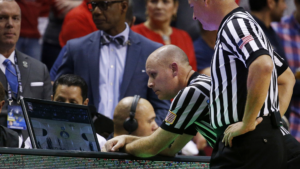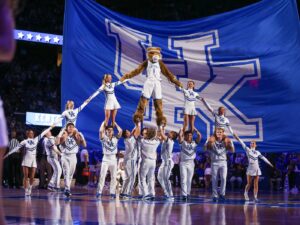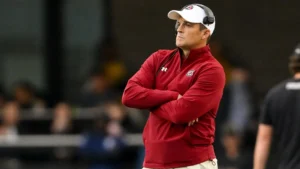
Mark Pope’s Goals for BYU Basketball: Assembling a Team Deserving of the Final Four and Fulfilling the Program’s Legacy
Since Mark Pope took over as the head coach of the BYU men’s basketball team in 2019, he has made a significant impact on the program. Known for his high-energy style of play, an emphasis on team culture, and a deep commitment to BYU’s values, Pope’s goals extend far beyond just winning games. They involve shaping a program that consistently competes at the highest level, develops players to their fullest potential, and ultimately reaches the pinnacle of college basketball. His vision for the program is one where BYU is not just a respected mid-major team, but one that regularly contends for a spot in the Final Four.
This piece will explore Mark Pope’s journey with BYU basketball, his strategies, and the long-term goals he has for the program. We will dive into the various aspects of the team-building process, from recruiting top-tier talent to creating a culture that fosters individual and collective success, and how Pope plans to take BYU to new heights in NCAA basketball.
The Early Years of Mark Pope at BYU
Mark Pope’s arrival at BYU in 2019 marked a new era for the Cougars. Prior to his appointment, the program had enjoyed periods of success but had also faced challenges in sustaining elite-level performance. Under previous head coach Dave Rose, BYU had been a competitive force in the West Coast Conference (WCC), but the program struggled to break through and secure a consistent place among the elite teams in college basketball.
Pope, who had been the head coach at Utah Valley University before coming to BYU, brought with him a wealth of experience and a strong track record. At Utah Valley, Pope turned a middling program into a contender, taking the Wolverines to multiple NCAA Tournament appearances and establishing himself as a rising star in the coaching ranks. When BYU came calling, Pope was ready for the challenge of building a program capable of reaching the highest levels in the country.
From the beginning, Pope was clear about his vision for BYU basketball. He aimed to build a team that not only competed for conference championships but also one that had the talent, discipline, and mentality to contend for the Final Four and even a national title. His approach involved both cultivating a strong team culture and focusing on player development, with an emphasis on a balanced offensive and defensive system that could adapt to the challenges posed by different opponents.
The Blueprint for Success: Recruiting and Player Development
A critical element of Mark Pope’s strategy is recruiting the right players to fit his system. Unlike some programs that rely heavily on high-profile, one-and-done recruits, Pope has focused on building a roster that combines experienced players with high-potential newcomers. Pope believes in developing talent over time, creating an environment where players can grow both as athletes and individuals, and preparing them for life after basketball.
One of Pope’s first major tasks was to recruit players who could immediately contribute to the program’s success. In the early years, Pope worked to retain BYU’s key players while also adding talented newcomers from high school and the transfer portal. Recruiting has always been a key strength of Pope’s approach, as evidenced by his success at Utah Valley, where he was able to land players who were undervalued by other programs. At BYU, Pope has continued to target players who possess not only skill and athleticism but also a strong work ethic and commitment to the team-first mentality that he promotes.
The transfer portal has been a particularly effective tool for Pope in assembling competitive rosters. With the increased accessibility to transfers, Pope has been able to bring in seasoned players who can have an immediate impact. These players often provide the kind of leadership and experience needed to complement the development of younger players. This ability to mix transfers with homegrown talent gives Pope the flexibility to build a well-rounded and competitive team year after year.
However, Pope’s recruitment strategy extends beyond just basketball skill. He seeks out players who align with the values and mission of BYU, prioritizing character, integrity, and academic excellence. For Pope, it’s not enough to recruit players who can score points or grab rebounds – he wants individuals who can be ambassadors for the program and contribute to the positive culture he’s building at BYU.
Once players are on campus, Pope’s approach to player development is focused on maximizing each individual’s potential. He is known for his intense focus on skill development, with practices that include a combination of fundamentals, game simulation, and mental toughness training. Pope’s staff works closely with each player to develop their strengths while addressing weaknesses, ensuring that every athlete improves throughout their time at BYU.
In addition to physical development, Pope places a strong emphasis on mental preparation. He understands that college basketball can be as much about mental resilience as it is about physical prowess. His coaching staff works to instill confidence, focus, and discipline in each player, preparing them for the high-pressure situations they’ll face in games, especially in close contests against some of the nation’s best teams.
Building a Championship-Level Culture
One of Mark Pope’s most important goals is to establish a culture of excellence at BYU that transcends wins and losses. This culture is built on accountability, leadership, and trust. Pope believes that in order to reach the Final Four, the team must be united in its commitment to working hard every day, supporting each other, and striving for greatness both on and off the court.
Pope’s leadership style is highly relational. He takes the time to connect with each player personally, understanding their motivations, goals, and challenges. This approach helps him build a strong bond with the team, fostering trust and respect among the players. In turn, this allows him to hold players to high standards, knowing that they will rise to the occasion because they believe in the program and in each other.
Beyond the players, Pope has also emphasized the importance of a strong, cohesive coaching staff. His assistants are not just teachers of the game – they are mentors who help players grow and develop in all areas of their lives. Pope believes that by creating an environment where players feel valued and supported, they will be more motivated to give their best on the court.
The emphasis on team-first mentality is evident in Pope’s approach to player roles. He consistently works to ensure that each player understands their role on the team, whether they are a starter or coming off the bench. Pope has shown an ability to get the best out of all his players, understanding that success is built on collective effort, not individual stardom.
This culture of excellence extends to how the team prepares for games. Pope emphasizes the importance of mental preparation, with players encouraged to focus on the process rather than the outcome. This mentality helps players maintain composure in high-pressure situations, which is critical when competing at the national level.
Competing for the Final Four
While Pope has laid a strong foundation in his early years at BYU, his ultimate goal is to take the team to the Final Four. This lofty aspiration is not just about winning games – it’s about creating a program that is capable of competing with the best teams in the country year after year. Pope knows that to get to the Final Four, BYU must be able to navigate the challenges of the NCAA Tournament, which is notoriously unpredictable and filled with high-level competition.
To do this, Pope has made it a priority to schedule tough non-conference games, which serve as both a challenge and a measuring stick for where the team stands. BYU’s schedule under Pope has featured matchups against powerhouses from major conferences, allowing the Cougars to test themselves against top-tier competition. Pope understands that regular season success in the WCC is important, but ultimately it’s the performances in March that will determine the program’s place among the elite.
Building a Final Four contender requires not only talent but also depth and versatility. Pope is actively working to ensure that his teams have the ability to adapt to different playing styles, whether they face a high-scoring offense or a stifling defense. This means recruiting players who are capable of contributing in multiple areas, from scoring to defense to leadership. Pope’s goal is for BYU to have a well-rounded team that can play in any type of game and still have a shot at winning.
Moreover, Pope has also emphasized the importance of building a competitive atmosphere in practice. The better the team is at pushing each other day in and day out, the more prepared they will be for the pressure and challenges of the NCAA Tournament. Pope encourages competition within the team, making sure that players are constantly improving and evolving. This internal drive to outperform one another will be key as BYU aims to make deeper runs in the tournament in the future.
The Future of BYU Basketball Under Mark Pope
Mark Pope’s vision for BYU basketball is clear: he wants to build a program that consistently competes at the highest level, with the ultimate goal of reaching the Final Four. While the Cougars have had success under Pope’s leadership, the journey is far from complete. Pope’s focus on recruiting, player development, and creating a championship-level culture provides the foundation needed to reach this lofty goal.
In the coming years, as Pope continues to build and refine his team, BYU basketball is poised for greatness. With a strong recruiting pipeline, a culture of excellence, and a commitment to player development, Mark Pope is well on his way to making BYU a perennial contender in the NCAA Tournament – and perhaps even a team deserving of a spot in the Final Four. The future of BYU basketball looks bright, and under Pope’s leadership, it’s only a matter of time before the Cougars make their mark on the national stage.





